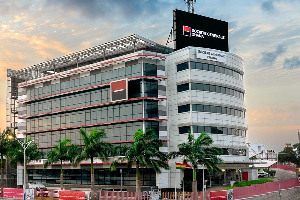- Home - News
- TWI News | TV
- Polls
- Year In Review
- News Archive
- Crime & Punishment
- Politics
- Regional
- Editorial
- Health
- Ghanaians Abroad
- Tabloid
- Africa
- Religion
- Election 2020
- Coronavirus
- News Videos | TV
- Photo Archives
- News Headlines
- Press Release
General News of Thursday, 3 October 2019
Source: ghananewsagency.org
Let your reportage influence policy and public conversation - Kojo Oppong Nkrumah
Mr Kojo Oppong Nkrumah, the Minister of Information, has called on Journalists to take the responsibility of writing reports that will draw the attention of society, including the governed and the governor to influence policy that will enhance development.
He said the media gave members of the public the opportunity to have “a cross fertilisation of ideas,” and a level playing ground from which politicians, Civil Society Organisations from all sides, and traditional rulers could have a conversation about the greater national good.
Mr Nkrumah said this when he launched the maiden Upper East Regional Ghana Journalists Association (GJA) awards in Bolgatanga on the theme: “Sustaining the peace in the Upper East Region: The role of the Journalist.”
According to him, several government projects were ongoing in the Region, but the media failed to report on them to educate citizens about how their Internally Generated Funds (IGF) were used for development purposes.
He said Journalists had the choice to determine the kind of subjects to feed their audiences, and urged them to let their reportage spearhead and guide decent public conversation.
He observed that some media houses, especially radio and television stations engaged in “one allegation or the other, which may not have been verified, and we make it a conversation and run over and over again, and what does that mean to the psyche and the spirit of the citizen at home,” he quizzed.
Mr Nkrumah who is also the Member of Parliament (MP) for the Ofoase-Ayirebi Constituency, said Journalists were in a position of public trust and could not afford to post their individual views on social media, “When people listen to you after a while on radio, or on TV or read your articles, they don’t distinguish between your private life and your public life.”
“So the views and the things that you put there are not different from what you put on your radio or your television. The market does not distinguish between that, it is your brand, now there will be a brand synergy between that brand on social media and that brand on television.”
He urged Journalists in the Region to apply the same standards they applied on their professional media platforms to their social media handlings, “Don’t necessarily lower the standards and say this is just my view on social media.” Mr Nkrumah said the 1992 constitution was set out to identify the role of the media in the democratic space, and insisted that “We as Journalists have a responsibility.”
Mr Eric Kwadjo Amoh, the Regional GJA Chairman said Journalists worked for the people and should not focus all attention on politicians because they performed their own assignments.
“What we need to do is to reveal to government the issues at hand for it to take over and control. To us in the Upper East Region, we have done so well, and we may not be praised from the outside because of that we will praise ourselves.”
He said most Journalists in the Region had discharged their duties so well and deserved to be rewarded, and as part of the GJA’s 70th Anniversary celebrations this year, the Association at the national level decided that its Regional branches should reward the contributions of its members.











